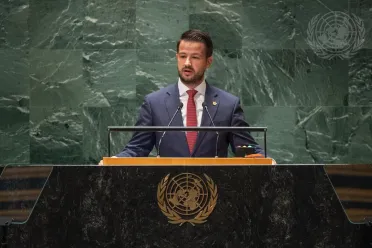Statement
Statement summary
JAKOV MILATOVIĆ, President of Montenegro, reaffirmed his country’s strong commitment to the goals and principles of the United Nations. While the current challenges require wise leadership, world leaders often resort only to sharing joint concerns rather than uniting efforts. Thus, a full return to the binding provisions of the Charter of the United Nations is necessary, he declared. His recent election, in his view, “marks an unprecedented level of support for a new era of [Montenegro’s] democratic development”. The citizens demand strengthening the rule of law, developing prosperity as well as ensuring social cohesion and equal opportunities, he claimed. This is key for safeguarding the country’s young democracy at a time when such systems of governance are in decline globally. He proclaimed zero tolerance for corruption and organized crime, as building independent institutions is vital for unlocking economic potential and improving living standards.
He detailed that his country’s foreign policy is based on three pillars — accelerating integration into the European Union, strengthening the credibility of Montenegro as a member of the North Atlantic Treaty Organization (NATO) and bolstering relations with all neighbouring countries in the Balkans. He stated that Podgorica’s speedy accession into the European Union would be the best signal that European integration is still alive. He went on to highlight the commencement of a meaningful dialogue with the civil society and vulnerable communities in his country, aspiring to create an environment of equal opportunities. He expressed hope that this will also inspire the world to defend democracy, human rights, freedom of choice, the rule of law as well as to ensure peace, prosperity and preservation of human lives. In this regard, condemning the Russian Federation’s unprovoked and unjustified aggression, he reaffirmed that his country stands with Ukraine.
Turning to humanitarian crises, he pointed out that the international community often replaces preventive responses with reactionary measures — the migration crisis in the Mediterranean region is just one example. This and other challenges stand in the way of achieving the Sustainable Development Goals. To accelerate progress, strong political commitment, more financial resources and enhanced cooperation are required, he underscored, calling also for action on combating climate change by unconditionally implementing the Paris Agreement. He spotlighted that in 1991, Montenegro adopted a declaration that made it the world’s first ecological State. Taking pride in transposing the 2030 Agenda into the country’s national framework through a corresponding strategy, he informed that, to accelerate its implementation, Podgorica also established a special fund. Further, he announced the enactment of fiscal, labour market and social security reforms that contributed to reducing inequality.
“As a member of the Human Rights Council during 2022-2024, we are determined to further strengthen the role of this pivotal international forum,” he stressed, reiterating his country’s adherence to respecting, protecting and promoting human rights. In this vein, Montenegro fosters a harmonious and inclusive domestic political environment. He expressed hope that also the Roma population will soon have representation in the Parliament. Calling on other countries to share responsibility in addressing the situation of refugees and migrants, he emphasized that Podgorica gave shelter to 100,000 refugees and displaced persons during the wars in former Yugoslavia. Montenegro has also opened doors to Ukrainians fleeing the conflict and hosts the highest number of them per capita in Europe. Advocating for the role and work of United Nations peacekeeping missions, he expressed support for increasing the presence of Montenegrin military forces therein.
Full statement
Read the full statement, in PDF format.
Photo

Previous sessions
Access the statements from previous sessions.
